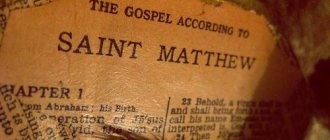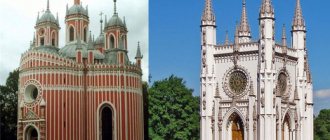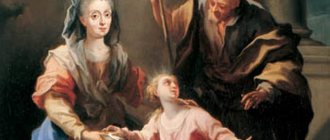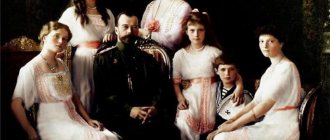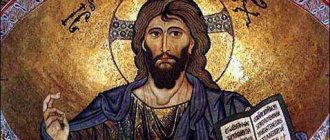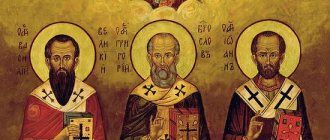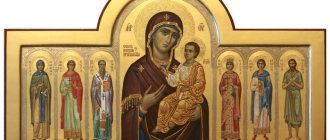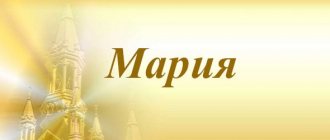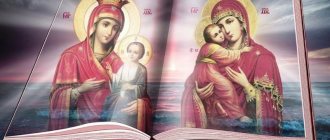About the parents of the Virgin Mary
The couple, Joachim and Anna, came from a noble family and were righteous before God. Having material wealth, they were not deprived of spiritual wealth. Adorned with all virtues, they immaculately observed all the commandments of God's law. For each holiday, pious spouses separated two parts from their property - one was given for church needs, and the other was distributed to the poor.
With their righteous life, Joachim and Annatak pleased God that He vouchsafed them to be the parents of the Blessed Virgin, the chosen Mother of the Lord. From this alone it is already clear that their life was holy, pleasing to God and pure, since they had a Daughter, the Holiest of all saints, who pleased God more than anyone else, and the Most Honest of the Cherubim.
At that time there were no people on earth more pleasing to God than Joachim and Anna, because of their immaculate lives. Although at that time it was possible to find many living righteously and pleasing God, these two surpassed everyone in their virtues and appeared before God as the most worthy for the Mother of God to be born from them. Such mercy would not have been granted to them by God if they had not truly surpassed everyone in righteousness and holiness.
But just as the Lord Himself had to be incarnate from the Most Holy and Most Pure Mother, so it was fitting for the Mother of God to come from holy and pure parents. Just as earthly kings have their purples, made not from simple matter, but from gold-woven material, so the Heavenly King wanted to have His Most Pure Mother, in whose flesh, as in royal purple, He had to put on, born not from ordinary incontinent parents, as would be from simple matter, but from chaste and holy ones, as if from cloth woven with gold, the prototype of which was the Old Testament tabernacle, which God ordered Moses to make from scarlet and scarlet cloth and fine linen (Ex. 27:16).
This tabernacle prefigured the Virgin Mary, in whom God dwelt “to dwell with men,” as it is written: “Behold, the tabernacle of God is with men, and He will dwell with them” (Rev. 21:3). The scarlet and scarlet cloth and fine linen from which the tabernacle was made typified the parents of the Mother of God, who came and was born from chastity and abstinence, as if from scarlet and scarlet clothing, and their perfection in fulfilling all the commandments of the Lord, as if from fine linen.
But these holy spouses, by God’s will, were childless for a long time, so that in the very conception and birth of such a daughter the power of God’s grace, the honor of the Born One and the dignity of the parents would be revealed; for it is impossible for a barren and aged woman to give birth otherwise than by the power of God’s grace: it is no longer nature that acts here, but God, who defeats the laws of nature and destroys the bonds of infertility. To be born from barren and elderly parents is a great honor for the one born herself, because she is born not from incontinent parents, but from abstinent and elderly ones, such as Joachim and Anna, who lived in marriage for fifty years and had no children.
Finally, through such a birth, the dignity of the parents themselves is revealed, since after a long period of infertility they gave birth to joy to the whole world, thereby becoming like the holy patriarch Abraham and his pious wife Sarah, who, according to the promise of God, gave birth to Isaac in his old age (Gen. 21:2). However, without a doubt, we can say that the Nativity of the Mother of God is higher than the birth of Isaac by Abraham and Sarah. Just as much as the born Virgin Mary herself is higher and more worthy of honor than Isaac, so much greater and higher is the dignity of Joachim and Anna than Abraham and Sarah.
They did not immediately achieve this dignity, but only through diligent fasting and prayers, in spiritual grief and in heartfelt sorrow, they begged God for this: and their sorrow turned into joy, and their dishonor was a harbinger of great honor, and the diligent petition of the leader to receive benefits, and prayer is the best intercessor.
Joachim and Anna grieved and cried for a long time that they had no children. Once, on a great holiday, Joachim brought gifts to the Lord God in the Jerusalem Temple; together with Joachim, all the Israelites offered their gifts as sacrifices to God. Issachar, the high priest at that time, did not want to accept Joachim’s gifts because he was childless.
“We should not,” he said, “accept gifts from you, because you do not have children, and therefore no blessings from God: you probably have some secret sins.”
Also, one Jew from the tribe of Reuben, who brought his gifts along with others, reproached Joachim, saying:
“Why do you want to make sacrifices to God before me?” Don't you know that you are not worthy to bring gifts with us, for you will not leave descendants in Israel?
These reproaches greatly saddened Joachim, and in great sorrow he left the temple of God, disgraced and humiliated, and the holiday for him turned into sadness, and the festive joy was replaced by sorrow. Deeply grieving, he did not return home, but went into the desert to the shepherds who tended his flocks, and there he cried about his barrenness and about the reproaches and reproaches made to him.
Remembering Abraham, his forefather, to whom God had given a son already in old age, Joachim began to earnestly pray to the Lord that He would grant him the same favor, would hear his prayer, have mercy and take away the reproach from people from him, granting him in his old age the fruit of his marriage, as Abraham once was.
“May I,” he prayed, “have the opportunity to be called the father of a child, and not endure reproaches from people childless and rejected from God!”
Joachim added fasting to this prayer and did not eat bread for forty days.
“I won’t eat,” he said, “and I won’t return to my house; Let my tears be my food, and let this desert be my home, until the Lord God of Israel hears and takes away my reproach.
In the same way, his wife, being at home and hearing that the high priest did not want to accept their gifts, reproaching her for barrenness, and that her husband had retired into the desert out of great sorrow, cried inconsolable tears.
“Now,” she said, “I am the most unfortunate of all: rejected by God, reproached by people and abandoned by my husband!” What to cry about now: about your widowhood, or about childlessness, about your orphanhood, or about the fact that you are not worthy to be called a mother?!
She cried so bitterly all those days.
Anna's slave, named Judith, tried to console her, but could not: for who can console one whose sadness is as deep as the sea?
One day, sad Anna went into her garden, sat down under a laurel tree, sighed from the depths of her heart and, raising her eyes, full of tears to the sky, saw a bird’s nest with little chicks on the tree. This sight caused her even greater grief, and she began to cry with tears:
- Woe to me, childless! I must be the most sinful among all the daughters of Israel, that I alone am so humiliated before all the wives. Everyone carries the fruit of their womb in their hands - everyone is comforted by their children: I alone am alien to this joy. Woe is me! The gifts of everyone are accepted in the temple of God, and they are shown respect for their childbearing: I alone am rejected from the temple of my Lord. Woe is me! Who will I be like? neither to the birds of the air, nor to the beasts of the earth: for they too bring You, O Lord God, their fruit, but I alone am barren. I cannot even compare myself with the earth: for it vegetates and grows seeds and, bearing fruit, blesses You, the Heavenly Father: I alone am barren on earth. Woe is me, Lord, Lord! I am alone, sinful, without offspring. You, Who once gave Sarah the son Isaac in her old age (Gen. 21:1-8), You, Who opened the womb of Anna, the mother of Your prophet Samuel (1 Sam. 1:20), look now upon me and hear my prayers. Lord Hosts! You know the reproach of childlessness: stop the sadness of my heart and open my womb and make me barren fruitful, so that we bring what I have born to You as a gift, blessing, singing and glorifying Your mercy in agreement.
When Anna cried and sobbed, an angel of the Lord appeared to her and said:
- Anna, Anna! your prayer has been heard, your sighs have passed through the clouds, your tears have appeared before God, and you will conceive and give birth to the most blessed Daughter; through Her all the tribes of the earth will receive blessings and salvation will be granted to the whole world; her name will be Maria.
Hearing the angelic words, Anna bowed to God and said:
“The Lord God lives, if a child is born to me, I will give him to serve God.” Let him serve Him and glorify the holy name of God day and night throughout his life.
After this, filled with indescribable joy, Saint Anna quickly went to Jerusalem, there to give thanks to God with prayer for His merciful visit.
At the same time, an Angel appeared to Joachim in the desert and said:
- Joachim, Joachim! God has heard your prayer and is pleased to grant you His grace: your wife Anna will conceive and give birth to you a daughter, whose birth will be a joy for the whole world. And here is a sign for you that I am preaching the truth to you: go to Jerusalem to the temple of God and there, at the golden gates, you will find your wife Anna, to whom I announced the same thing.
Joachim, surprised by such angelic news, praising God and thanking Him with his heart and lips for his great mercy, hastily went to the Jerusalem temple with joy and joy. There, as the angel had told him, he found Anna at the golden gate, praying to God, and told her about the angel’s gospel. She also told him that she had seen and heard an angel who announced the birth of her daughter. Then Joachim and Anna glorified God, who had shown them such great mercy, and, having worshiped Him in the holy temple, they returned to their home.
And Saint Anna conceived on the ninth day of December, and on the eighth of September her daughter was born, the Most Pure and Most Blessed Virgin Mary, the beginning and intercessor of our salvation, at whose birth both heaven and earth rejoiced. On the occasion of Her birth, Joachim brought great gifts, sacrifices and burnt offerings to God, and received the blessing of the high priest, priests, Levites and all the people for being worthy of God's blessing. Then he arranged a rich meal in his house, and everyone glorified God with joy.
Her parents took care of the growing Virgin Mary like the apple of their eye, knowing, by a special revelation of God, that She would be the light of the whole world and the renewal of human nature. Therefore, they raised Her with such careful prudence as befitted the One who was to be the Mother of our Savior. They loved Her not only as a daughter, long awaited, but also revered Her as their mistress, remembering the angelic words spoken about Her, and foreseeing in spirit what would happen to Her.
She, filled with Divine grace, mysteriously enriched her parents with the same grace. Just as the sun illuminates the stars of heaven with its rays, giving them particles of its light, so God’s chosen Mary, like the sun, illuminated Joachim and Anna with the rays of the grace given to her, so that they too were filled with the Spirit of God and firmly believed in the fulfillment of the angelic words.
When the youth Mary was three years old, her parents led Her with glory into the temple of the Lord, accompanying her with lighted lamps, and dedicated Her to the service of God, as they had promised. Several years after the introduction of Mary into the temple, Saint Joachim died, eighty years old. Saint Anna, remaining a widow, left Nazareth and came to Jerusalem, where she remained near her Most Holy Daughter, praying incessantly in the temple of God. Having lived in Jerusalem for two years, she rested in the Lord, being 79 years old.
Oh, how blessed are you, holy parents, Joachim and Anna, for the sake of your Most Blessed Daughter!
You are especially blessed for the sake of Her Son, our Lord Jesus Christ, through whom all the nations and tribes of the earth received blessings! It is right that the Holy Church called you Fathers of God, 3 for we know that God was born from your Most Holy Daughter. Now standing close to Him in heaven, pray that at least some part of your endless joy will be given to us. Amen.
Troparion, tone 1:
Who in legal grace was righteous and gave birth to a God-given child to us, Joachim and Anna: the same day, joyfully celebrating, the divine church honors your memory, glorifying God, who raised the horn of salvation for us in the house of David.
Kontakion, voice 2:
Now Anna rejoices, having resolved her infertility, and nourishes the Most Pure One, calling all to sing praises, who from her womb bestowed upon man one Mother and the unartful
Similar
Ever-Virginity
The Blessed Virgin Mary is the Ever-Virgin (Greek: 'Αειπαρθένος - always Virgin). This means that She was a Virgin before the birth of Jesus Christ from Her, at the time of His birth, and remained a Virgin after His birth. There are cases in the history of the Church when the doctrine of the ever-virginity of B. was not recognized. This was due to the duality in the understanding of fragments of some New Testament texts. In particular, in Holy Scripture the Virgin Mary is called “Wife.” Moreover, Jesus Christ Himself uses this name (John 2:4; 19:26). Explaining the meaning of this fragment of the Gospel text, St. Ambrose of Milan wrote: “Why should we be embarrassed by the name “Wife”? It refers to gender, it is a name for gender, not an indication of a lack of innocence. Popular usage does not prejudge the truth” (On the education of a virgin and the ever-virginity of St. Mary, to Eusebius. 5).
The ever-virginity of the Mother of God was sometimes disputed (by anti-Marians) on the grounds that the Infant of God born by Her is called in the Gospel “firstborn” (Luke 2:7), and not “only begotten” (i.e. “first”, and not “only”) . To this John of Damascus replied: “The firstborn is the one who was born first, even if he were the only begotten” (John of Damascus, Exact Exposition of the Orthodox Faith, IV, 14). According to the testimony of St. Epiphanius of Cyprus, doubt was also raised by the mention in the Gospels of the brothers and sisters of the Savior. Some believed that the brothers and sisters were relatives of Jesus Christ (Epiphanius of Cyprus, On the 80 heresies of Panarius, or the Ark, 9). However, according to Epiphanius of Cyprus, this is refuted by the Savior himself, who entrusts B. to the ap. John, and not “Her relatives or the children of Joseph, if they were from Her” (ibid., 7). The doctrine of ever-virginity B. The Church keeps as a special secret of faith. However, patristic tradition speaks of Her as “one of the same tribe and akin to us” (Andrew of Crete, Homily for the Nativity of the Blessed Virgin Mary, 2nd). “Having inherited the corruptible body” of Adam, the Virgin Mary bore the mark of original sin. In order to grow “to the measure of the full stature of Christ” (Eph. 4:13), the Virgin Mary needed the new gift of the Holy Spirit, which She, together with the Church, receives on the day of Pentecost. The Christian teaching about the Mother of God was formulated during the era of the Ecumenical Councils and was preserved unchanged in Orthodoxy.
